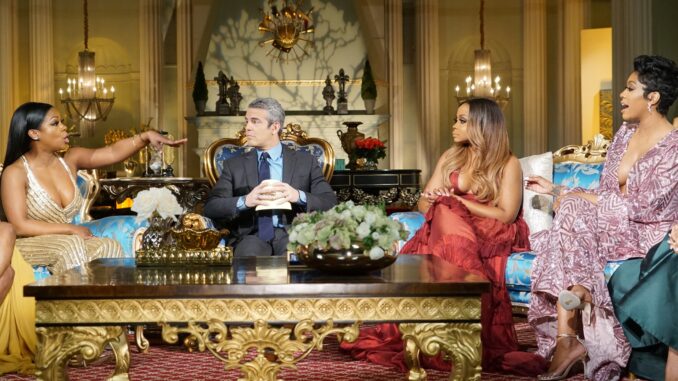
The Unforgiven: A Tense Showdown Between Kandi Burruss and Porsha Williams
The air in the opulent Atlanta restaurant hung thick, not just with humidity, but with years of unspoken resentment and simmering animosity. On one side, Kandi Burruss, the Grammy-winning mogul, sat ramrod straight, her signature weave gleaming under the chandelier, her eyes narrowed to slits. Across from her, Porsha Williams, the vivacious radio personality and activist, fidgeted, her usual effervescent energy replaced by a palpable anxiety. This wasn’t just a lunch between reality television co-stars; it was a tense showdown, a culmination of accusations, whispers, and betrayals that had cleaved their once-close friendship in two.
The roots of their fractured relationship ran deep, a tangled mess of rumors, assumptions, and a single, devastating lie. The accusation, uttered by Phaedra Parks years prior, that Kandi and her husband Todd had planned to drug and take advantage of Porsha, hung in the air like a specter, a constant reminder of the irreparable damage it had wrought. While Phaedra had since been exposed and ostracized, the fallout lingered, poisoning the well of trust between Kandi and Porsha.
Kandi, understandably, bore the brunt of the anger and hurt. The allegation was a personal affront, a violation that cut to the core of her character. Her hard-earned reputation, her commitment to family and integrity, had been dragged through the mud, leaving her raw and vulnerable. Every forced smile, every carefully chosen word in Porsha's presence felt like a betrayal, a reminder that the woman she had considered a friend had readily believed the worst about her.
Porsha, on the other hand, was caught in a web of her own making. She had initially feigned ignorance, claiming to be a victim of gossip and manipulation. However, the truth, unearthed in subsequent seasons, revealed a more nuanced picture. While she hadn't concocted the lie, she had readily repeated it, lending it credibility and amplifying its impact. She'd been motivated, perhaps, by a desire to fit in, to align herself with the popular girls, to stay relevant in the high-stakes world of reality television. But her choices had come at a heavy price.
The silence at the table stretched, punctuated only by the clinking of silverware from nearby diners, oblivious to the drama unfolding before them. Finally, Kandi broke the tension, her voice sharp and controlled. “So, Porsha,” she began, her gaze unwavering, “we’re here. What is it you want to say?”
Porsha, her eyes darting around the room, took a deep breath. The apology, meticulously rehearsed in her mind, felt inadequate, a flimsy band-aid on a gaping wound. “Kandi, I… I know I messed up. I believed something I shouldn’t have, and I repeated it. I’m truly sorry for the pain it caused you and your family.”
Kandi remained impassive, her face a mask of carefully constructed neutrality. “Sorry isn’t enough, Porsha. It almost destroyed my life. My reputation. My marriage.” The words hung in the air, heavy with unspoken emotion.
The conversation that followed was a delicate dance of accusations and apologies, justifications and regrets. Porsha attempted to explain her reasoning, her vulnerabilities, her desire to belong. Kandi countered with the impact of her actions, the sleepless nights, the endless anxiety, the constant fear of judgment. Each word was a step forward, a step back, a desperate attempt to bridge the chasm that had widened between them.
Ultimately, there was no grand reconciliation. The scars ran too deep, the wounds too fresh. However, there was a glimmer of hope, a tentative understanding born from the shared experience of surviving a brutal ordeal. Kandi acknowledged Porsha's remorse, while Porsha recognized the magnitude of her transgression. They agreed to coexist, to be civil, to move forward, albeit cautiously.
The showdown ended not with a resolution, but with a truce, an uneasy peace forged in the crucible of reality television. As they parted ways, a subtle shift had occurred. While the friendship might be irreparably damaged, a fragile respect remained. Perhaps, in time, the wounds would begin to heal, allowing them to navigate the treacherous waters of Atlanta society with a newfound awareness of the power of words and the enduring strength of forgiveness. The unspoken question, however, remained: could the forgiven ever truly forget? Only time would tell.